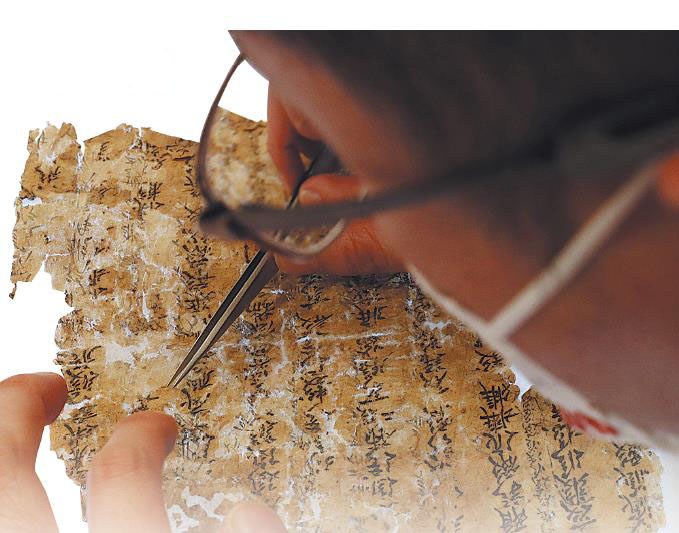Book restorers bound to saving the past


Ancient works preserved as digitization efforts produce results
For a decade, Xie Jincheng has been immersed in his duties at the National Library of China in Beijing. When asked how old he was, the 37-year-old had to pause for a few seconds to remember.
Each working day, he sits at a desk and focuses on handling ragged yet priceless pieces of paper in front of him. As one of 17 restorers of ancient books at the NLC, he shakes off centuries of old dust to renew the works he deals with.
Xie does not require a large space to utilize his skills. Using glue, scissors, tweezers, brushes and several other simple implements, he deftly restores the pages in front of him.
"I can basically handle most situations when fixing books, but you always have to be prepared for new problems," he said.
It is estimated that the NLC houses more than 3 million ancient Chinese books. The world's biggest collection of its kind, it comprises about 10 percent of such books in the nation. In China, the term "ancient books" refers to works predating 1911, the end of the Chinese monarchy.
Xie, who majored in chemistry at college, switched to cultural relics conservation at graduate school, realizing that there was a shortage of restorers of ancient books in China. Despite his multidisciplinary educational background, he thought that practicing a traditional craft was the best way to improve his skills.
It took Xie more than two years of observing his tutors and honing his talent before he was formally assigned to restore his first page.
Everyone working in this industry has to learn a saying from the Ming Dynasty (1368-1644) book Zhuanghuangzhi: "Restoration (of books) is like seeing a doctor. If the doctor is good, your illness will disappear immediately following treatment. But if not, you may die taking the medicine. So if you cannot see a good craftsman, you'd better keep your item as it is."
Xie's given name can be compared to the approach he adopts to his work, as jincheng means "to be cautious and sincere". To ensure quality, he only restores a few pages a day, and if the damage is severe, it sometimes takes him several days to fix a single page. It takes much longer to search for the right paper to restore books, based on their original material.
"Sometimes it's impossible to get identical paper, so we need to process this ourselves," Xie said.


















